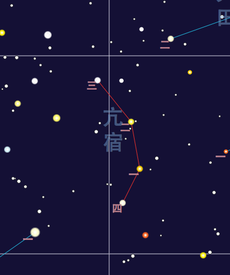
Neck (Chinese constellation)
Encyclopedia

Twenty-eight mansions
The Twenty-eight Mansions , ', ' or ' are part of the Chinese constellations system. They can be considered as the equivalent to the zodiacal constellations in the Western astronomy, though the Twenty-eight Mansions reflect the movement of the Moon in a lunar month rather than the Sun in a solar year...
of the Chinese constellation
Chinese constellation
Chinese constellations are the way the ancient Chinese grouped the stars. They are very different from the modern IAU recognized constellations. This is because the IAU was based on Greco-Roman astronomy instead of Chinese astronomy....
s. It is one of the eastern mansions of the Azure Dragon
Azure Dragon (Chinese constellation)
The Azure Dragon is one of the Four Symbols of the Chinese constellations. It represents the east and the spring season. It should not be confused with the mythological yellow dragon that is associated with the Emperor of China...
.
In Chinese Cosmology, the Kang Constellation is associated with the Kidney Organ. 亢 is a picture of a person standing with their legs open, as in horse stance, and so holds the quality of strength that comes through a proper foundation. This matches up with Chapter 8 of the Suwen, which says that the Kidney is in charge of strength and fortification. The Kidney houses the Zhi, which is in charge of solid grounding in one’s life purpose.
Kang is also the neck or throat of the Azure Dragon of the East, which, while the throat area is ruled by the Lung, has everything to do with sound—pointing to the Kidney’s orifice of the ears.
Around the 5th Century BC, it is believed that eclipses would take place in this constellation. This coming together of the Sun and the moon works as a symbol that points towards the ShaoYin relationship of the Kidney and Heart.
Asterisms
| English name | Chinese name | European constellation Constellation In modern astronomy, a constellation is an internationally defined area of the celestial sphere. These areas are grouped around asterisms, patterns formed by prominent stars within apparent proximity to one another on Earth's night sky.... |
Number of stars | Representing |
| Neck | 亢 | Virgo Virgo (constellation) Virgo is one of the constellations of the zodiac. Its name is Latin for virgin, and its symbol is . Lying between Leo to the west and Libra to the east, it is the second largest constellation in the sky... |
4 | Azure Dragon Azure Dragon (Chinese constellation) The Azure Dragon is one of the Four Symbols of the Chinese constellations. It represents the east and the spring season. It should not be confused with the mythological yellow dragon that is associated with the Emperor of China... 's neck |
| Great Horn | 大角 | Boötes Boötes Boötes is a constellation in the northern sky, located between 0° and +60° declination, and 13 and 16 hours of right ascension on the celestial sphere. The name comes from the Greek Βοώτης, Boōtēs, meaning herdsman or plowman... |
1 | Azure Dragon Azure Dragon (Chinese constellation) The Azure Dragon is one of the Four Symbols of the Chinese constellations. It represents the east and the spring season. It should not be confused with the mythological yellow dragon that is associated with the Emperor of China... 's horn or national imperial throne |
| Left Conductor | 左攝提 | Boötes Boötes Boötes is a constellation in the northern sky, located between 0° and +60° declination, and 13 and 16 hours of right ascension on the celestial sphere. The name comes from the Greek Βοώτης, Boōtēs, meaning herdsman or plowman... |
6 | Seasonal officials in the left |
| Right Conductor | 右攝提 | Boötes Boötes Boötes is a constellation in the northern sky, located between 0° and +60° declination, and 13 and 16 hours of right ascension on the celestial sphere. The name comes from the Greek Βοώτης, Boōtēs, meaning herdsman or plowman... |
6 | Seasonal officials in the right |
| Trials | 頓頑 | Lupus Lupus (constellation) Lupus is a constellation in the southern sky. Its name is Latin for wolf. Lupus was one of the 48 constellations listed by the 2nd century astronomer Ptolemy, and it remains one of the 88 modern constellations... |
2 | Trial or prison officials |
| Gate of Yang | 陽門 | Centaurus Centaurus Centaurus is a bright constellation in the southern sky. One of the largest constellations, Centaurus was included among the 48 constellations listed by the 2nd century astronomer Ptolemy, and it remains one of the 88 modern constellations.-Stars:... |
2 | Frontier's gate |
| Executions | 折威 | Libra Libra (constellation) Libra is a constellation of the zodiac. Its name is Latin for weighing scales, and its symbol is . It is fairly faint, with no first magnitude stars, and lies between Virgo to the west and Scorpius to the east.-Notable features:]... /Hydra Hydra (constellation) Hydra is the largest of the 88 modern constellations, measuring 1303 square degrees. It has a long history, having been included among the 48 constellations listed by the 2nd century astronomer Ptolemy. It is commonly represented as a water snake... |
7 | Officials in the execution or enforcement of the death penalty |

